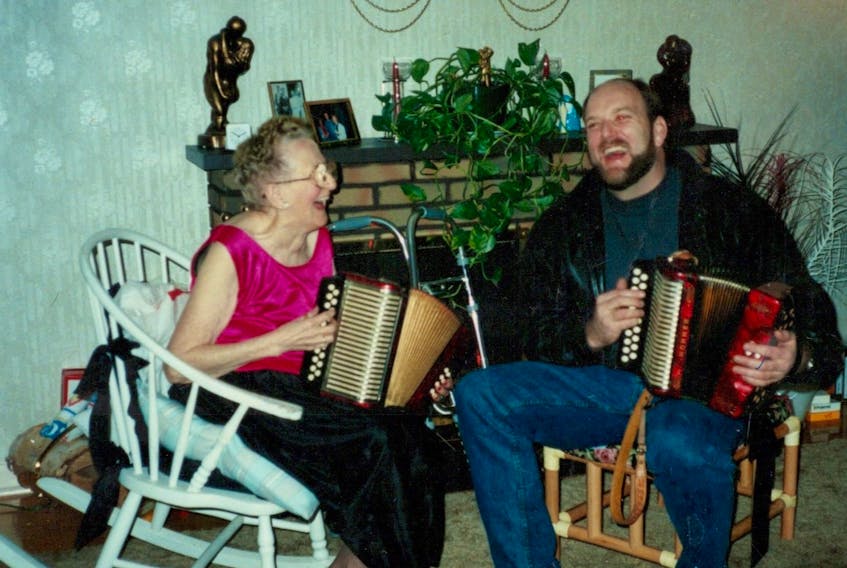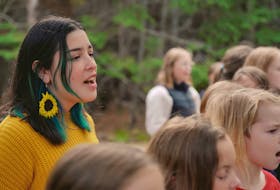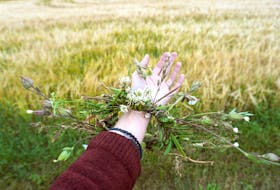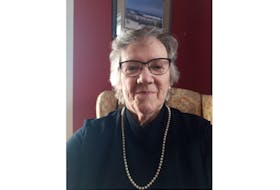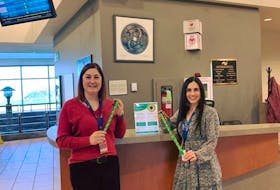ST. JOHN'S, N.L. — Before she was known as Newfoundland’s first lady of the accordion, with accolades such as the Order of Canada, Minnie White did what many teenage girls did in the early 20th century — at 16, she left her family behind in St. Alban’s and moved to the Codroy Valley to work as a housekeeper.
There, she was a familiar performer at community dances playing piano. She had learned the accordion from her father at age eight, but she didn’t return to the instrument until later in life — in between, she married, had six children and ran a family farm.

“I did not always like accordion music, but Minnie White changed my mind on that,” said The Folk podcast creator and host Mike Tod.
Her music influenced Tod so profoundly that the fourth episode of the Calgary resident’s new national podcast — profiling folk musicians across the country — is all about White.
“I hope listeners, if they are maybe skeptical of accordion music, that after listening to this podcast, they’ll end up liking it, too.”
More than that, Tod was drawn to White’s story.
It was typical of young women at the time — many of the joys of youth were put aside to run a household and raise a family. Things that were put aside included the accordion.
White was married in 1937, and dedicated her life to raising six children while running the family farm with her husband.
But in the 1960s, she began playing again. She also single-handedly hired musicians for accompaniment, composed, financed and managed her first recordings.
She toured Newfoundland and Nova Scotia, and had gigs on television.
“She didn’t know the meaning of the word that, you know, you can’t do something,” said musician and producer Jim Payne, who was White’s friend, and produced her final album when she was 78 years old.
Her reputation as Newfoundland’s "first lady of the accordion" was solidified in the 1960s and 1970s.
“Everyone loves a comeback story, and Minnie’s story is certainly that,” said Tod.
He said what she was able to accomplish later in life was incredible, and he hopes podcast listeners learn how important a figure she was in Canadian music.
“There’s a wonderful lesson at the core of this story: it’s never too late to do what you love.”
White was awarded the Order of Canada in 1993. Two years later, at age 79, she was nominated for an East Coast Music Award for instrumental artist of the year.
Payne said he believes it was White’s strong will that accounted for her success.
“She tackled everything that came her way with the same kind of fortitude and sense of, ‘Look, this is what needs to be done, so I’m going to do it.’ I mean, right up to the end.
“Last time I saw her, she was in hospital in Port aux Basques. She wasn’t well, but she gave me a hug when I left, and I could feel the strength in her still. She was still upbeat and positive, and making jokes.
“I feel very fortunate to have known her. It chokes me up just to remember her,” Payne said, his voice breaking.
White continued to perform until her death in 2001 at age 85.
Tod’s research involved interviewing people who knew White, such as family and friends. He said he learned she had two important traits that likely played a role in her success.
“She had a strong drive. This is a person who knew exactly what she wanted to do, and then she did it. And she was also a person who was extremely open — musically curious,” he said, describing how she incorporated the popular music of the day into her own more traditional sound.
Tod said with everyone he has profiled on The Folk, their music tends to be very well-known, but the person not as much.
“It was my goal to shine a light,” he said.
Season 1 of The Folk features 13 one-hour episodes about a folk artist from each province and territory. Tod chose White to represent folk music in Newfoundland and Labrador, something
Payne calls “absolutely entirely appropriate” given that she was a musical pioneer.
The first four episodes of The Folk are online at thefolkpodcast.com.
Twitter: @juanitamercer_

